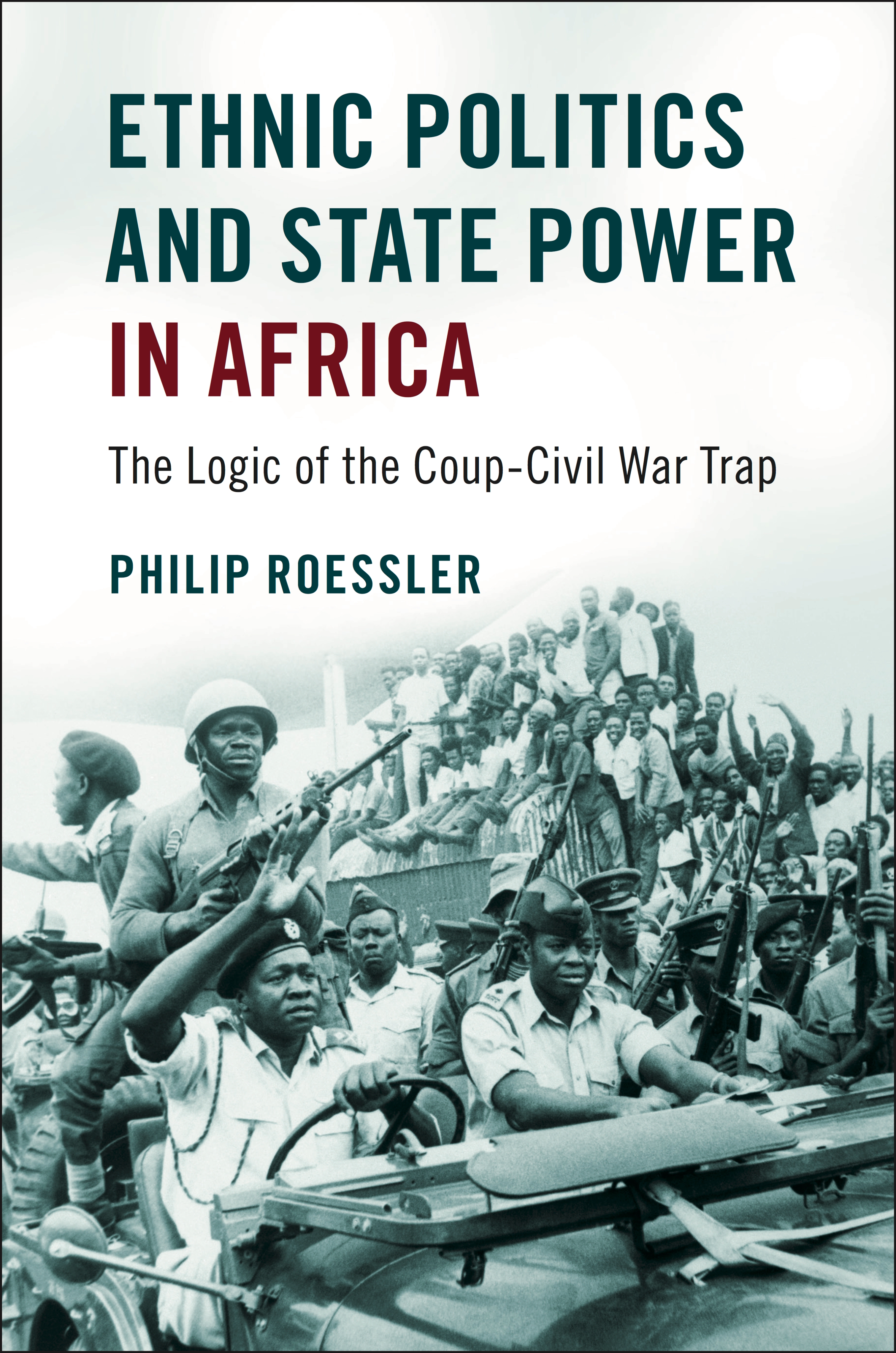 This research project explores the strategic logic of war and peace in weak states, with a focus on sub-Saharan Africa. It models rulers of weak states as facing a coup-civil war trade-off: Striking alliances with elites embedded in rival ethnic groups is necessary to secure societal peace. But sharing real power with ethnic rivals can be dangerous if it opens the door for them to usurp power in a future coup d’état. I argue this strategic dilemma has been at the heart of some of Africa’s most devastating conflicts from the Biafran War in Nigeria in the late 1960s to the Rwandan genocide to Africa’s Great War in Congo to the Darfur civil war to tragically the outbreak of war in the newly independent country of South Sudan (see here for my application of the coup-civil war trap to the outbreak of the war in South Sudan).
This research project explores the strategic logic of war and peace in weak states, with a focus on sub-Saharan Africa. It models rulers of weak states as facing a coup-civil war trade-off: Striking alliances with elites embedded in rival ethnic groups is necessary to secure societal peace. But sharing real power with ethnic rivals can be dangerous if it opens the door for them to usurp power in a future coup d’état. I argue this strategic dilemma has been at the heart of some of Africa’s most devastating conflicts from the Biafran War in Nigeria in the late 1960s to the Rwandan genocide to Africa’s Great War in Congo to the Darfur civil war to tragically the outbreak of war in the newly independent country of South Sudan (see here for my application of the coup-civil war trap to the outbreak of the war in South Sudan).
Research on the coup-civil war trap has led to a number of publications, including my 2011 article in World Politics, “The Enemy Within: Personal Rule, Coups and Civil War in Africa,” which won the Gregory Luebbert Award from the American Political Science Association for best paper in comparative politics for 2010 or 2011; my book, Ethnic Politics and State Power in Africa: The Logic of the Coup-Civil War Trap (Cambridge University Press, 2016), summarized below; and an article co-authored with Dave Ohls in International Organization, “Self-enforcing Powersharing in Weak States,” 2018.
Ethnic Politics and State Power in Africa
Summary of the book
At its essence, civil war is a form of violent conflict over the distribution of state power. The puzzle then is what prevents rivals from dividing power in a way that all would prefer to devastating large-scale political violence. Greed? Miscalculation? Ethno-nationalism? Pride? In my book with Cambridge University Press, Ethnic Politics and State Power in Africa: The Logic of the Coup-Civil War Trap, I make the case for the importance of fear or mistrust borne out of uncertainty. I argue that in weak states with divided societies, rulers (and their co-ethnics) know they need to share power to extend the reach of the central government beyond their own group, but are loath to do so if it merely strengthens their rivals’ capabilities to usurp power for themselves in a future coup d’état. This uncertainty prevents rulers from fully committing to powersharing and to favor exclusionary policies to hedge against the coup. But given the weakness of the state, exclusion undermines the government’s control over other societal groups, increasing the risk of civil war. Employing a nested research design that combines qualitative case studies of Sudan and Democratic Republic of Congo, based on extensive field research, with a range of statistical analyses, this book describes how the African state confronts rulers with a coup-civil war trap, and civil war represents a strategic choice by rulers, backed by their co-ethnics, to protect their hold on power from their ethnic rivals. The corollary of this, however, is that as the threat capabilities of one’s rival increases due to their size and proximity to the capital, ethno-political exclusion becomes less strategically advantageous. Consistent with this, the book further shows how the coup-civil war trap plays out across sub-Saharan Africa is conditional on a country’s ethnic geography and distribution of societal power. When the major axis of political competition is between several large ethnic groups proximate to the capital, the threat of a mutually costly total conflict for state power induces rivals to choose powersharing and accept coup risk over civil war risk.
Contributions of the book
- Offers a complete and integrated theory of civil war onset—that is, how and why bargaining over the distribution of state power ends in large-scale political violence.
- Breaks down the artificial division within political science on the study of coups and civil wars and accounts for the strategic relationship between the two phenomena.
- Elucidates, through a structured comparison of temporal variation in violence in Darfur, how inter-ethnic alliances reduce civil war risk through the institution of cooperative counterinsurgency.
- Original theory on the roots of self-enforcing powersharing in Africa, which helps to account for Africa’s two equilibriums—the exclusion-civil war cycle vs. powersharing-peace order.
- Exemplar of the benefits of mixed-methods research, including extensive, rigorous field research, to build and test theory.
- Situates two of Africa’s deadliest conflicts—Darfur and Africa’s Great War—in comparative perspective and shows that both arise from the same dynamics.
For book reviews of Ethnic Politics and State Power in Africa, see here.
